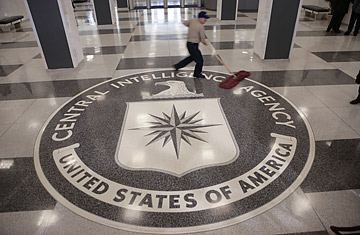
The logo of the U.S. Central Intelligence Agency is swept clean in the lobby of the CIA headquarters in Langley, Virginia.
(3 of 4)
But while the advent of an NID would recast the intelligence community's pecking order, it could also make things worse. "There's too little competition for ideas already in this business," says John Hamre, Deputy Secretary of Defense in the Clinton Administration. "That's what happened with WMD. If you have one guy for whom everybody works, then you're going to start getting a homogeneous view." And despite its calls for sweeping organizational change, the 9/11 panel offers few specific suggestions for how the U.S. and its allies can improve in the most critical area of all: getting actionable human intelligence on al-Qaeda and its attack plans by infiltrating terrorist networks. Says Hamre: "All these reorganizing efforts are kind of rearranging the boxes of the people that supply intelligence, when we really need to be talking about how we demand better-quality intelligence across the board."
Since Sept. 11, say intelligence and counterterrorism experts, the U.S. and its allies have made significant strides in keeping al-Qaeda off balance. Better coordination among intelligence services around the world has led to several major busts, including the liquidation of the terrorist cell suspected of carrying out March's train bombings in Madrid. Western agencies that once ignored websites, chat rooms and other communications channels used by extremists are now tapping them effectively to pick up chatter. "They've gotten good at not only picking up possible messages between plotters but analyzing information more quickly to determine what is just radical railing and what has substantial hidden meaning," says French terrorism expert Roland Jacquard. Despite the continued debate over the treatment of prisoners at Guantanamo Bay, Cuba, CIA and FBI officials insist that some high-level detainees have proved valuable in decoding talk among operatives. The war in Afghanistan and the global dragnet have taken out of circulation about half of bin Laden's senior lieutenants. "The kinds of people who are coming in simply can't match their predecessors and their ability to run the organization," says a CIA official. But he adds that "as we kill a group, we are facing a movement." Al-Qaeda and like-minded extremist outfits are thought to be operating in as many as 60 countries and may have as many as 20,000 trained militants on their rolls. Magnus Ranstorp, a terrorism expert at the University of St. Andrews in Scotland and a consultant to several governments, estimates that even if this Administration or the next one gets serious about intelligence reform, "it will take five to 10 years for U.S. intelligence to have adequate resources" on the ground for countering the full range of forces fueling extremist terrorism.
